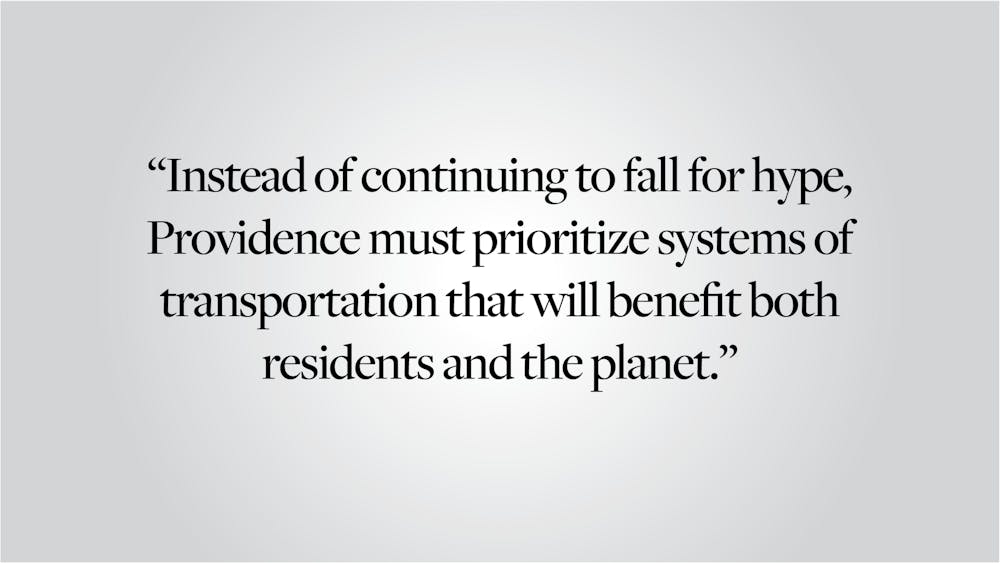I don’t like cars. They’re loud, expensive and they spew carbon dioxide everywhere. However, rentable electric scooters are not the solution, and actually contribute to net emissions. It’s time for Providence to promote more a environmentally friendly mode of transportation: the RIPTA bus system.
There is no doubt that curtailing car use is a vital part of combating climate change. Cars and other light-duty vehicles make up nearly half of all greenhouse gas emissions in the transportation sector and a sixth of overall emissions in the U.S. Unless we want houses in Kansas to become ocean-front property, we need to rethink our transportation system.
Credit where credit’s due: the municipal government of Providence has attempted to promote alternatives to cars multiple times in the past via the Shared Micromobility Program. Started in 2018, the program partners with private companies that rent out electric bicycles and scooters by the minute. Today, Providence partners with companies Bird, Spin and Veo, and the companies’ vehicles are ubiquitous throughout the city.
Even so, e-scooters have failed to live up to promises of environmentalism, and Providence would be better off prioritizing the RIPTA bus system.
Let’s start with claims about environmentalism. A major sales pitch is that e-scooters reduce total emissions by replacing trips that would otherwise be made by car. It is certainly true that electric bikes and scooters are far more environmentally friendly than cars due to reduced energy consumption. However, according to a study conducted by North Carolina State University in 2019, only 34 percent of rides on e-scooters replace car rides. The rest replace more efficient and environmentally-friendly methods of transportation such as bicycles (e-bikes included), buses and walking. The result is that although car emissions decrease, e-scooters create a net increase in greenhouse gas emissions.
The idea that e-scooters are more cost-effective for low-income people in Providence is also dubious. Bird applies a 50 percent discount for low-income riders, which when applied to the local pricing scheme yields an upfront fee of $0.50 and an additional fee $0.20 per minute. Meanwhile, Spin has a discounted rate of $0.50 along with a $0.10/minute rental fee. The rider would pay a total of $2.40 in this case. Veo offers the most generous deal, allowing low-income riders to pay a monthly fee of $5.00, which then gives subscribers access to 30 minutes of riding time per day free of charge, with no unlocking fee. For context, a RIPTA fare with no discount costs $2.00 for an hour of unlimited rides. In this scenario, only Veo beats out the standard RIPTA fare assuming a 19 minute commute. Of course, this relies on there being a Veo brand e-scooter consistently available near the rider’s home address.
I do believe that the Shared Micromobility Program as a whole can be redeemed. One change is to force companies to alter their fleet composition to include more bicycles as opposed to scooters. As it stands, the limits imposed by the city of Providence upon micromobility companies are equal for scooters and bicycles. These limits could be adjusted to increase the number of e-bikes, which produce one-fifth of the amount of carbon dioxide compared to scooters.
Instead of going all-in on e-scooters, Providence can both reduce its negative impact on the environment as well as help the economically disadvantaged by providing subsidies for low-income residents to take the RIPTA. Although the RIPTA does offer reduced fares, only senior citizens and persons with disabilities are eligible. Providing financial incentives to broaden the number of people who take the bus would have two positive effects. The first is that low-income residents would have increased access to affordable transportation, which is critical for escaping poverty. The second is that it would reduce RIPTA’s emissions per capita. Buses are much more efficient than cars and scooters in terms of greenhouse gas emissions, but only if there is high ridership.
The scooters scattered across the streets of Providence do next-to-nothing to ameliorate the problems with our transportation system. Instead of continuing to fall for the hype, Providence must prioritize systems of transportation that will benefit both residents and the planet.
Victor Chang ’27 can be reached at victor_a_chang@brown.edu. Please send responses to this opinion to letters@browndailyherald.com and other op-eds to opinions@browndailyherald.com.





